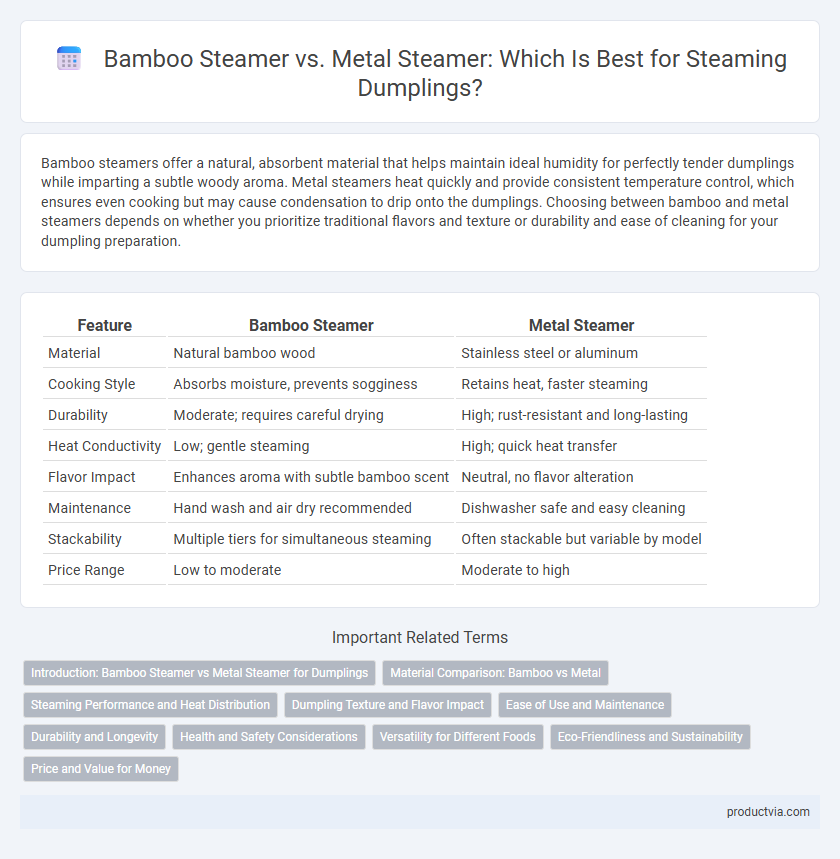Bamboo steamers offer a natural, absorbent material that helps maintain ideal humidity for perfectly tender dumplings while imparting a subtle woody aroma. Metal steamers heat quickly and provide consistent temperature control, which ensures even cooking but may cause condensation to drip onto the dumplings. Choosing between bamboo and metal steamers depends on whether you prioritize traditional flavors and texture or durability and ease of cleaning for your dumpling preparation.
Table of Comparison
| Feature | Bamboo Steamer | Metal Steamer |
|---|---|---|
| Material | Natural bamboo wood | Stainless steel or aluminum |
| Cooking Style | Absorbs moisture, prevents sogginess | Retains heat, faster steaming |
| Durability | Moderate; requires careful drying | High; rust-resistant and long-lasting |
| Heat Conductivity | Low; gentle steaming | High; quick heat transfer |
| Flavor Impact | Enhances aroma with subtle bamboo scent | Neutral, no flavor alteration |
| Maintenance | Hand wash and air dry recommended | Dishwasher safe and easy cleaning |
| Stackability | Multiple tiers for simultaneous steaming | Often stackable but variable by model |
| Price Range | Low to moderate | Moderate to high |
Introduction: Bamboo Steamer vs Metal Steamer for Dumplings
Bamboo steamers provide a natural, absorbent surface that prevents dumplings from becoming soggy while allowing even steam circulation, preserving delicate textures and flavors. Metal steamers offer faster heat conduction and durability, making them ideal for quick cooking and easy cleaning, but may cause condensation to drip and affect dumpling texture. Choosing between bamboo and metal steamers depends on balancing traditional cooking benefits and modern convenience for perfect dumplings.
Material Comparison: Bamboo vs Metal
Bamboo steamers offer natural heat absorption and moisture retention, which enhances the flavor and texture of dumplings by preventing sogginess. Metal steamers, typically made of stainless steel, provide faster heat conduction and greater durability but may cause condensation to drip back onto food, potentially altering the dumpling's surface texture. Choosing between bamboo and metal steamers depends on whether you prioritize traditional flavor preservation or modern efficiency and resilience in cooking.
Steaming Performance and Heat Distribution
Bamboo steamers provide gentle, even heat distribution ideal for maintaining the delicate texture and moisture of dumplings, preventing them from becoming soggy. Metal steamers offer faster heat conduction and durability but may cause uneven steaming or stickiness if not monitored closely. Choosing the right steamer depends on desired steaming performance, with bamboo favored for traditional, consistent results and metal for efficiency and quick cooking.
Dumpling Texture and Flavor Impact
Bamboo steamers preserve dumpling texture by allowing gentle, even steam circulation that prevents sogginess and maintains a delicate, slightly chewy wrapper. Metal steamers conduct heat faster but can create condensation, often resulting in a softer, sometimes wetter dumpling exterior. The natural aroma of bamboo subtly enhances the dumpling flavor, adding a mild woody note absent in metal steamers.
Ease of Use and Maintenance
Bamboo steamers offer lightweight construction and natural materials that resist sticking, making them easy to handle and clean with just a simple wipe or rinse. Metal steamers, often made of stainless steel, provide durability and dishwasher compatibility but require thorough drying to prevent rust and occasional descaling. Both types allow efficient steaming, yet bamboo models demand gentler care to avoid cracking, while metal ones withstand high temperatures and frequent use with minimal upkeep.
Durability and Longevity
Bamboo steamers offer natural breathability and gentle heat distribution but tend to absorb moisture, which can lead to quicker wear and potential mold if not properly dried, impacting durability over time. Metal steamers, typically made from stainless steel or aluminum, provide superior longevity due to their resistance to rust, corrosion, and physical damage, making them ideal for frequent use. Choosing between the two depends on whether natural steaming qualities or long-term durability and ease of maintenance are prioritized for dumpling preparation.
Health and Safety Considerations
Bamboo steamers are naturally antimicrobial and free from harmful chemicals, making them a safer option for steaming dumplings without the risk of metal leaching. Metal steamers, typically made from stainless steel, offer durability and easy cleaning but may pose concerns if low-quality alloys release metals during high-heat cooking. Choosing bamboo ensures a toxin-free, breathable steaming environment, while metal requires careful selection of food-grade materials to maintain health and safety.
Versatility for Different Foods
Bamboo steamers offer gentle, even heat ideal for delicate dumplings, fish, and vegetables, preserving moisture and texture without condensation drips. Metal steamers provide faster steaming with higher heat retention, making them suitable for a wider range of foods like rice, meats, and vegetables that require longer cooking times. Choosing between bamboo and metal steamers depends on the desired cooking versatility and the type of dishes frequently prepared.
Eco-Friendliness and Sustainability
Bamboo steamers offer superior eco-friendliness due to their renewable, biodegradable materials and low energy production impact compared to metal steamers, which rely on resource-intensive mining and manufacturing. Bamboo steamers naturally absorb moisture and allow steam to circulate effectively without condensing, reducing energy use during cooking. Metal steamers, often made from stainless steel or aluminum, provide durability but contribute more to environmental pollution and carbon emissions throughout their lifecycle.
Price and Value for Money
Bamboo steamers generally offer a lower price point and natural material appeal, making them a cost-effective choice for steaming dumplings with authentic flavor preservation. Metal steamers, often made of stainless steel, tend to have a higher upfront cost but provide greater durability, faster heat conduction, and long-term value through resistance to rust and deformation. For budget-conscious users seeking traditional aesthetics, bamboo steamers deliver excellent value, while metal steamers suit those prioritizing longevity and efficient steaming performance.
Bamboo steamer vs Metal steamer for dumplings Infographic

 productvia.com
productvia.com